On this page:
- Montessori pedagogy
- Students
- Graduates
- Student support
- Languages
- New technology
- Recruitment
- Achievements
- Difficulties/challenges

Our Kids spoke with Sylvia Macias-Dworkin, an American from Los Angeles, California, an expert in Montessori pedagogy, and principal of the Warsaw Montessori School.
Our Kids: How long have you been in Poland?
Sylvia Macias-Dworkin: My husband and I moved to Poland 12 years ago. Looking for an adventure, I checked a Montessori website, and saw that in Poland, in Warsaw, Małgosia Tarnowska (the owner of Warsaw Montessori School) needed someone to help manage the school for a year or so to be a stay-at-home mom. I was offered the position and so off we went.
Małgosia returned to work after two months, we got to work, and the school started to grow so quickly. She had two preschools and the elementary program was in its starting years. It was so exciting I couldn’t imagine leaving and by that time we were also very close with Małgosia and her family.
Years later the WMF opened two toddler centres, the middle school, and this year the high school. I’m really attached to the school and the families here. I’ve known many children from the age of two onwards, and now and some of them are going to high school. This school turned out to be my family away from my birth family.
Our Kids: Do you have any Polish roots, as your last name might indicate?
Sylvia Macias-Dworkin: I don’t, but my husband's great-grandmother was from Lithuania. I know that Lithuania was once part of Poland, so he’s Polish in a sense.
Montessori pedagogy
Our Kids: Why is Montessori pedagogy still so popular all over the world?
Sylvia Macias-Dworkin: Families who choose Montessori are looking for an alternative to traditional education.
What probably appeals most to people is the relationship between the teacher and the child. I think parents and children feel and notice that the teachers are really dedicated, and have a calling. This isn’t just a job, but more of a vocation, involving dedication to families and the student. When we’re hiring teachers, we’re primarily looking for the right people. Of course, they must have all the required qualifications, but for us, the most important is the human dimension. This is how Montessori schools operate and where their appeal comes from. At Montessori schools, there’s a learning environment full of peace, mindfulness, order, and caring. Family is important. That’s what’s kept it running for a excess of one hundred years.
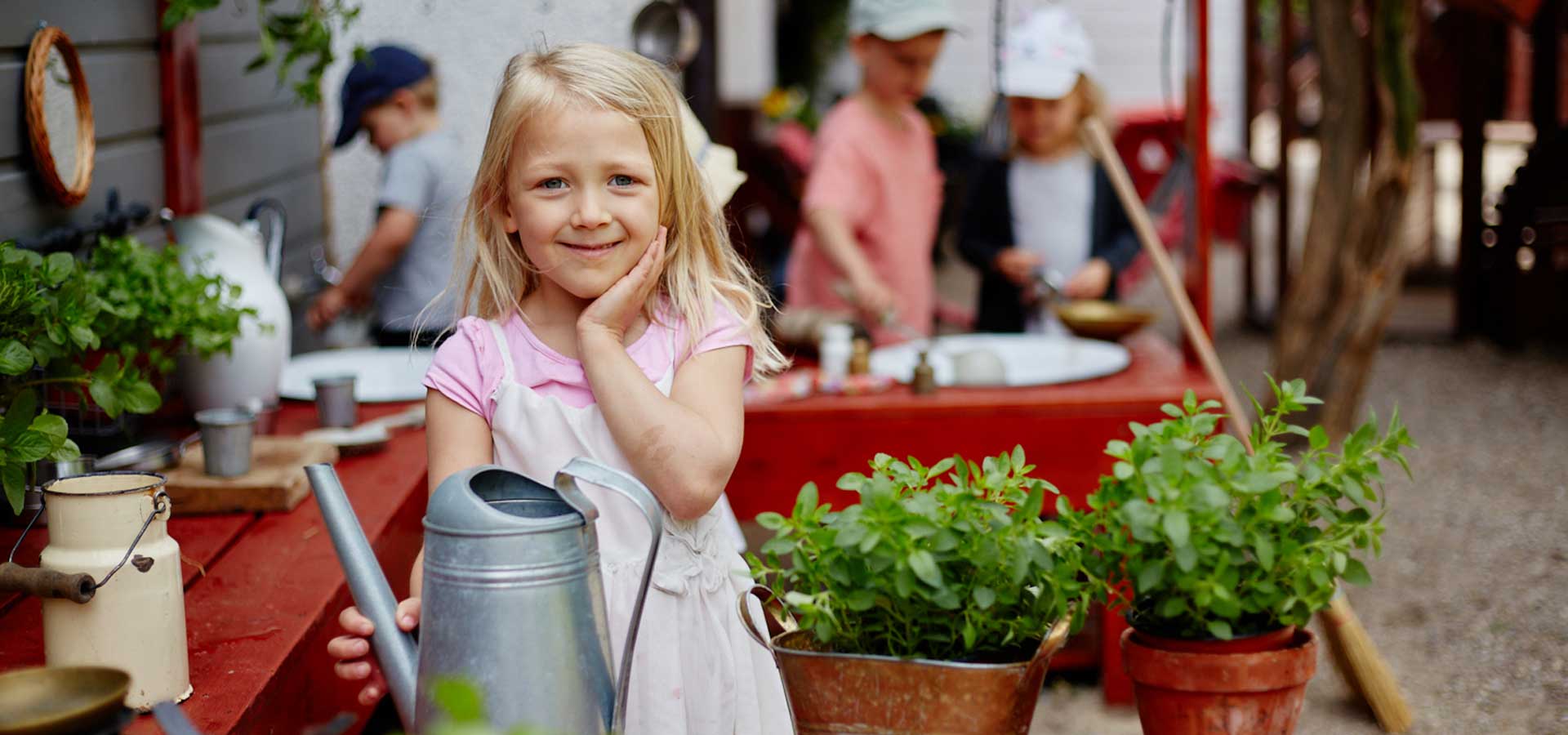
Our Kids: Is it possible to run a school that has only “a little Montessori” in its program?
Sylvia Macias-Dworkin: No, it’s really important to apply this methodology fully. It's almost a way of life. We have to be committed all the way.
Our Kids: Do you think people know enough about the Montessori system in Poland?
Sylvia Macias-Dworkin: A lot more than when we first came. There are training centres now, and more and more Montessori schools which I see as I drive around the city and where I live outside the city. Clearly, interest in Montessori pedagogy is really catching on. Many teachers are changing from traditional to Montessori. Some universities offer Montessori classes, not as training but as theoretical lectures.
Our Kids: You have extensive experience in Montessori pedagogy in the United States. Are there any differences between how it’s implemented in the US and Poland?
Sylvia Macias-Dworkin: Not in the way of implementing pedagogical assumptions. The difference is that in the United States, private schools have a lot of freedom, as long as they meet certain criteria and there’s evidence of this. There’s no obligation to implement the national curriculum imposed by any ministry. Here, however, we have to deal with the implementation of both the Polish curriculum and Montessori pedagogy. There’s no conflict in certain areas, for instance, that there are children of different ages in one class or that we have the same teacher for all three years. Of course, according to the Polish program, we teach Polish history and geography. Also, we have to reconcile what the Ministry of National Education (MEN) requires with preserving the Montessori spirit.
Our Kids: Most people associate Montessori with kindergarten. But you go much further—you have an elementary school and now even a high school. How does the Montessori system work for children who are a little older?
Sylvia Macias-Dworkin: When children get older and enter a further stage of development, we try to implement all the principles of Montessori pedagogy, and we do that while implementing the Polish curriculum. First of all, we’re a Montessori school, and secondly, we’re an English-speaking school and we must add the Polish core curriculum to this.
In Grades 5 to 8 on the elementary school campus, we’ve incorporated Montessori elements like farming, animal husbandry, cooking, and cleaning. Children are responsible for looking after their environment—they prepare the place for classes and they cook in a fully-equipped kitchen. They also have entrepreneurship classes and they even start their own businesses—they make jams, bake cookies, make linseed oil, put them in jars and bottles and sell them. They also have their chickens. They have a beautiful greenhouse.
According to traditional Montessori principles, they themselves choose what they want to do.
Another Montessori principle is learning outside the classroom. Children are taking many trips abroad. They’ve been to Israel, Austria, and Germany.
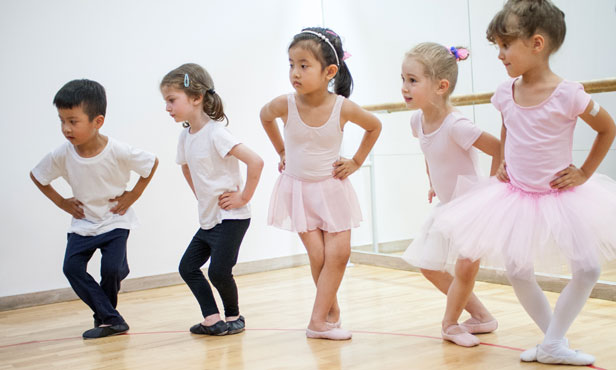
Students
Our Kids: Who are the students at your school?
Sylvia Macias-Dworkin: At first, most families were international. Now, most—about 70%—are Polish families. All these Polish parents speak English, because they either work in companies where English is spoken or have studied abroad, and many of them have lived in other countries, such as the United States. Twenty to twenty-five percent are children from families where one of the parents is Polish. The other children are from foreign families who came to Poland for work.
When I came to Poland, mainly non-Polish students studied at the school, and then it became trendy among Poles to send children to a Montessori school. Over the past five years, we’ve had a lot of foreign students again, because many foreigners come to Poland—for instance, people from China, India, Vietnam, and Spanish. Thus, we have a very nice variety of families and nationalities here at the school.
Most families are two-parent Polish families. They virtually all speak English, and have learned the language. Then we have 20% to 25% of one parent Polish and one international. Or families that are working in Poland short term.
Graduates
Our Kids: How are your school graduates different from traditional school graduates?
Sylvia Macias-Dworkin: The Montessori philosophy says every child has their own individual talent, each is different, and that’s why we have to work individually with the children. Our children have confidence in themselves, are fully committed, and they have high self-esteem. This makes them stand out. When children come from a traditional educational setting and have never been in the Montessori system, we talk to them as Montessori teachers talk: in a kind, warm way, using polite words like "please" and "thank you," they’re actually surprised. But it slowly becomes normal for them, and they also start to talk with us like that.
We see huge changes in these children. When our children finish school, they’ll continue their studies full of confidence, as well as knowledge of how the world works, because they’ve grown a lot with the school. They know about entrepreneurship, because they learned it here. They also know how to behave, show respect, and are passionate. They’re dedicated to their studies.
Part of the Montessori philosophy is the principle that you should give back: to others, your environment, the community, and eventually to the world. Our students hear this throughout their education. If they feel good about themselves, that's half the battle.
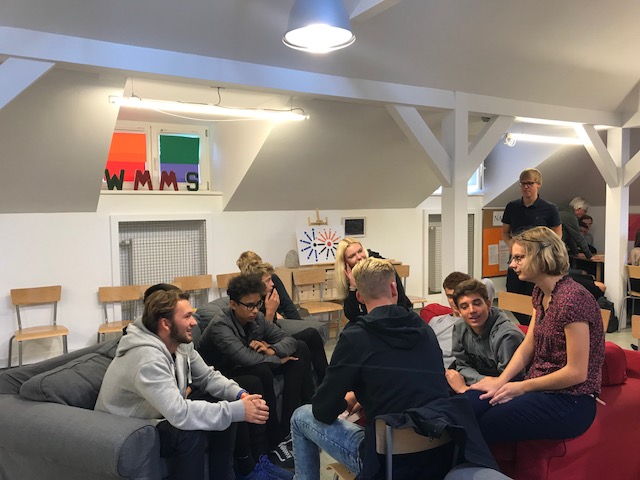
Student support
Our Kids: Does the school provide additional help for students?
Sylvia Macias-Dworkin: We try to help less wealthy families through financial aid.
In addition, kids get a lot of support from school, because we have many resources. We also provide additional assistance if needed—we have a school counselor and a school psychologist to refer children to if problems are serious. We also provide our teachers with additional training, so they can work with students with certain disabilities.
We aren’t looking for perfect children—we’re looking for motivated children. Of course, we have children with special needs, and it enriches us all. We see how they change, and how they develop and become part of the mainstream student community. When children work at their own pace, it gives them pleasure—they do very well without being constantly told "you must learn."
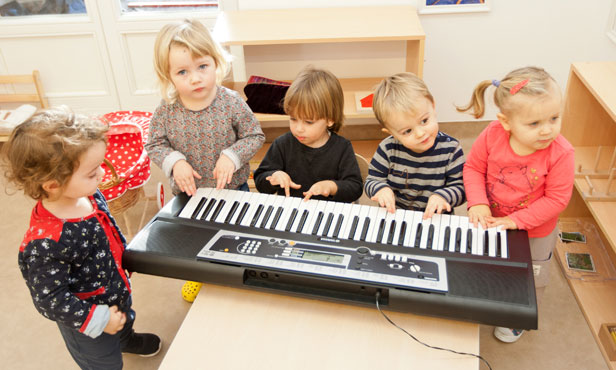
Languages
Our Kids: Do all children, including those from international families, need to learn Polish?
Sylvia Macias-Dworkin: Yes. We have additional language lessons in the morning. Children in the English-language program learn Polish, and children who follow the Polish program or bilingual program have English classes with our native speakers.
Of course, this requires a lot of work to properly plan the class schedule, but it’s working great so far. It must be. As Ms. Małgosia, the owner of the school, decided to open a high school.
New technology
Our Kids: The world is moving fast technologically. Do you incorporate modern technical achievements in your teaching model?
Sylvia Macias-Dworkin: Children know technology even better than we do. When I say that my telephone has failed, children are immediately ready to help me. They’re really savvy. We add technology to our extracurricular activities, which we have many. We have dance, football, sewing, Bollywood—everything you can dream of. We’re constantly expanding IT classes—we’re already creating new classes, because it’s very popular. At school, we use technology for strictly academic purposes—it’s limited to research and presentations.
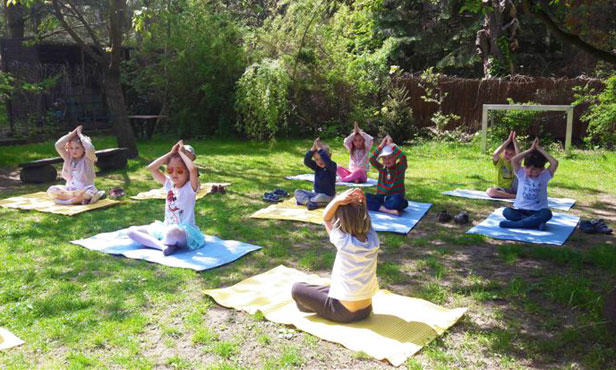
Recruitment
Our Kids: Now that you have high school, if a child comes who hasn't been to your primary school before, does he need to take the entrance exams?
Sylvia Macias-Dworkin: They have to do an assessment, to see where their level is, but we don’t have entrance exams. It’s very important to us that parents tell us if the child has any emotional or social problems. Parents need to work hard with us to help us give the children everything they need to be successful.

Achievements
Our Kids: What are the most important achievements of the school?
Sylvia Macias-Dworkin: Probably if a poll of our families were conducted, asking them to evaluate on a scale from 0 to 10 their satisfaction, I think over 80% would choose 10. Every morning, I hear children saying: "I love coming to school! It’s always so nice here!" In fact, there’s an exceptionally friendly learning environment here, where everyone is welcome. Parents enjoy the family-friendly environment. They’re very involved in the community.
Close relationships with students’ families are important to us. Our students' parents feel as if they’re in an extended family. We strive to ensure parents are also included in our community. We have days when parents visit school, because we want them to spend some time here and watch their children learn. We have a concert once a month: Warsaw philharmonics plays for us. All families come to these concerts.
Our Kids: And the exam results?
Sylvia Macias-Dworkin: The results are fluctuating. When our foreign students take exams in Polish and their knowledge of Polish is not 100%, it reflects in the results. But overall, most of our students are really very accomplished. Individual results are very nice. Our children are always either in the middle or in the higher ranking results, though results fluctuate.
A few of our children have won national awards for their English. This happens almost every year.
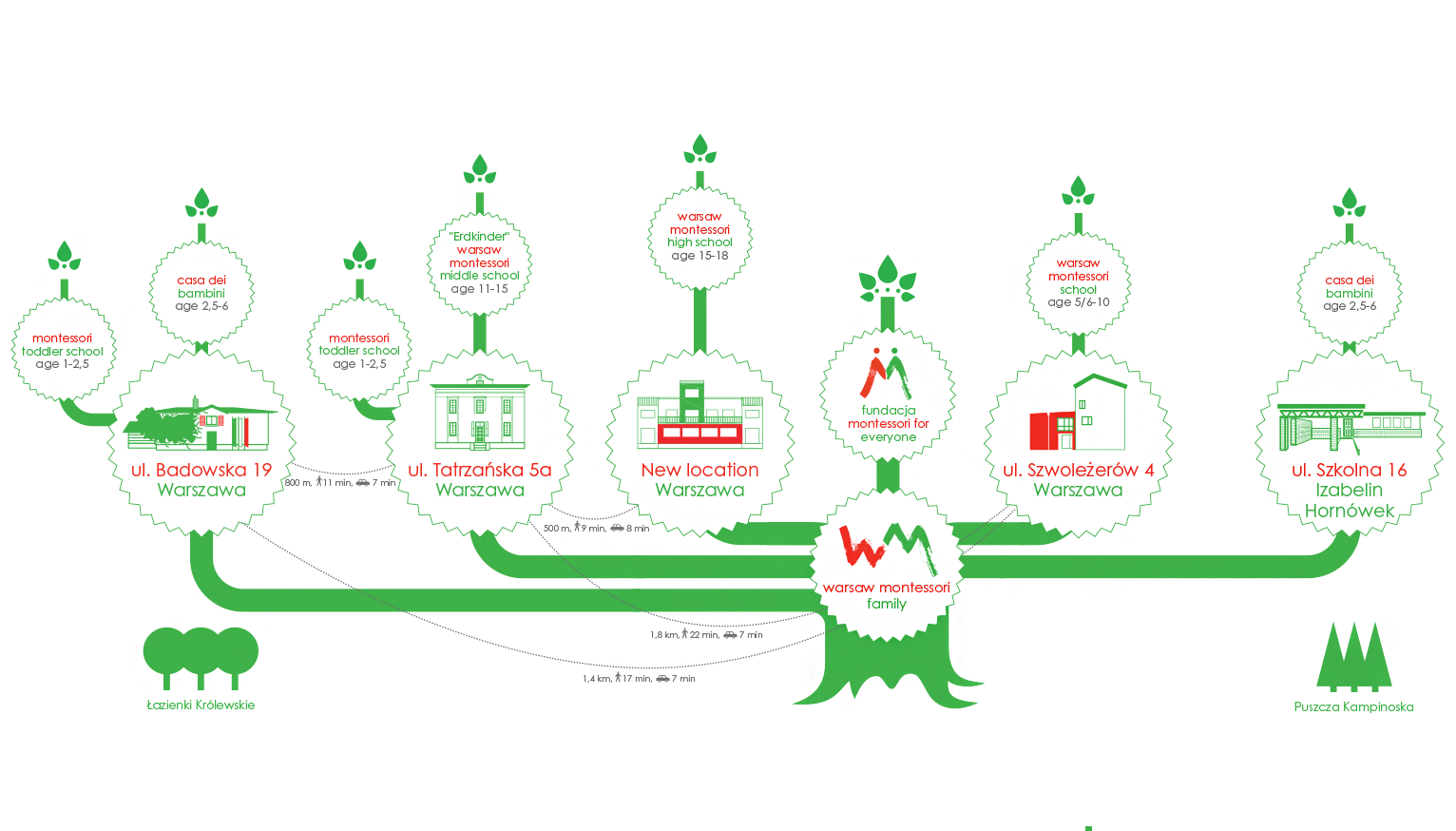
Difficulties/challenges
Our Kids: Are there any problems or challenges in your work?
Sylvia Macias-Dworkin: Sometimes we have new students whose parents enroll them because they’ve heard Montessori schools are good. It’s important we help our parents get better informed about Montessori education and techniques and to understand the Montessori system itself, how the materials work, and how they change from the primary years, to elementary school, to high school. Another issue is absence. Sometimes families take their children on wonderful trip which are an education in itself. At the same time, when it happens during the school year, the child gets a mixed message and may feel school is less important. And so, we sometimes have to emphasize the importance fair discipline, routines, and deadlines to parents.
All in all, we have a beautiful mix of caring and loving and interesting students, parents and staff at WMF. That is what makes us a FAMILY!
People who read this also viewed:
- Warsaw private schools
- Kraków private schools
- Poznań private schools
- Wrocław private schools
- Łódź private schools
- Rzeszów private schools
- Gdańsk & Gdynia private schools
-
Advice Guide
- ABC of educational terminology: Glossary of terms and concepts
- The admissions process
- Advantages and disadvantages of studying in an international school
- The application process
- Benefits of Polish private schools
- Bilingual schools
- Boarding schools
- Choosing a private or nonpublic school in Poland
- Compare schools in Poland
- English schools in Warsaw
- Homeschooling
- International schools in Kraków
- International schools
- Private school interviews
- Music education
- Myths about private education
- Non-public schools in Poland
- School open houses
- Our Kids Interview: Get to know EF Academy Oxford
- Our Kids Interview: Get to know Open School
- Our Kids interview: Get to know Regent College International Schools
- Our Kids Interview: Get to know The American School of Warsaw
- Our Kids Interview: Get to know The British School Warsaw
- Our Kids Interview: Get to know Wrocław Cosmopolitan School (two interviews, new video)
- Poland school profiles
- Private day schools
- Gifted schools & programs
- Private Jewish schools in Poland
- Language schools
- Private school tuition and costs in Poland
- Private schools in Poland
- Private schools in Poland offering French-language immersion
- English immersion schools
- Poland school uniforms
- Private special needs schools in Warsaw
- Public versus non-public schools in Poland
- Private school questions
- Private school rankings
- Reasons for choosing private schools - Our Kids’s survey report
- Religious schools
- Schools and classes for children with ADHD in Poland
- Social primary schools
- Social Schools
- Special educational needs (SPE) certificates
- Special needs schools
- Study abroad at a private school
- The first annual non-public school fair in Poland
- The first annual Our Kids non-public school expo in Warsaw was a great success
- Third Private School Expo in Warsaw - summary
- Types of schools
- Types of schools in Warsaw
- Warsaw preschool costs
- Why private school?
- Why parents go private
-
Grades
- Boarding high schools
- Choosing a high school in Poland
- Mokotow High School Campus - a new Warsaw high school and Thames British School campus
- Montessori nursery schools
- Montessori preschools
- Our Kids Interview: Get to know English Montessori School Katowice
- Our Kids Interview: Get to know FSA School
- Our Kids Interview: Get to know KIDS & Co.
- Our Kids Interview: Get to know Polish British Academy of Warsaw
- Our Kids Interview: Get to know The English Playhouse and The English Primary
- Poland education: grade levels
- Preschools in Warsaw
- Private & non-public preschools
- Private & non-public primary schools
- Private bilingual elementary schools in Warsaw
- Private high schools
- Private high schools in Warsaw
- Private middle schools
- Nursery schools
- Private primary schools in Warsaw
- Social high schools
-
Locations
- Boarding schools in Warsaw
- English schools in Kraków
- International Baccalaureate (IB) schools in Warsaw
- International schools in Warsaw
- Montessori schools in Warsaw
- Non-public schools in Warsaw
- Our Kids Interview: Get to know EF Academy
- Our Kids interview: Get to know Excellence in Education better
- Our Kids Interview: Get to know PRIMUS Non-Public Primary School No. 47 and Non-Public Secondary School
- Our Kids Interview: Get to know the Canadian School of Warsaw
- Our Kids Interview: Get to know The Primary and Secondary Schools of the Sisters of Nazareth in Warsaw
- Private Catholic and Christian schools in Warsaw
- Private day schools in Warsaw
- Private language schools in Warsaw
- Private schools in Bialystok
- Bydgoszcz schools
- Częstochowa schools
- Private schools in Gdańsk & Gdynia
- Katowice schools
- Private schools in Krakow
- Lublin schools
- Olsztyn schools
- Private schools in Poznań
- Private schools in Rzeszów
- Szczecin schools
- Private schools Warsaw
- Private schools in Wrocław
- Zielona Góra schools
- Private schools in Łódź






 POL
POL CAN
CAN